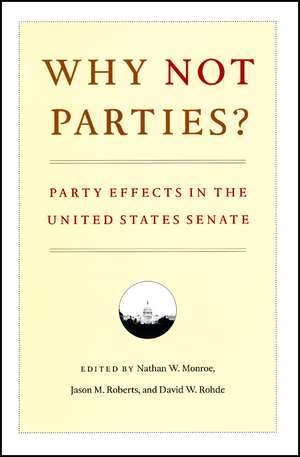Why Not Parties?: Party Effects in the United States Senate
Editat de Nathan W. Monroe, Jason M. Roberts, David W. Rohdeen Limba Engleză Paperback – oct 2008
Recent research on the U.S. House of Representatives largely focuses on the effects of partisanship, but the strikingly less frequent studies of the Senate still tend to treat parties as secondary considerations in a chamber that gives its members far more individual leverage than congressmen have. In response to the recent increase in senatorial partisanship, Why Not Parties? corrects this imbalance with a series of original essays that focus exclusively on the effects of parties in the workings of the upper chamber.
Illuminating the growing significance of these effects, the contributors explore three major areas, including the electoral foundations of parties, partisan procedural advantage, and partisan implications for policy. In the process, they investigate such issues as whether party discipline can overcome Senate mechanisms that invest the most power in individuals and small groups; how parties influence the making of legislation and the distribution of pork; and whether voters punish senators for not toeing party lines. The result is a timely corrective to the notion that parties don’t matter in the Senate—which the contributors reveal is far more similar to the lower chamber than conventional wisdom suggests.
Preț: 174.85 lei
Preț vechi: 215.22 lei
-19% Nou
Puncte Express: 262
Preț estimativ în valută:
33.46€ • 34.86$ • 27.70£
33.46€ • 34.86$ • 27.70£
Carte indisponibilă temporar
Doresc să fiu notificat când acest titlu va fi disponibil:
Se trimite...
Preluare comenzi: 021 569.72.76
Specificații
ISBN-13: 9780226534893
ISBN-10: 0226534898
Pagini: 282
Ilustrații: 40 line drawings, 26 tables
Dimensiuni: 152 x 229 x 18 mm
Greutate: 0.4 kg
Editura: University of Chicago Press
Colecția University of Chicago Press
ISBN-10: 0226534898
Pagini: 282
Ilustrații: 40 line drawings, 26 tables
Dimensiuni: 152 x 229 x 18 mm
Greutate: 0.4 kg
Editura: University of Chicago Press
Colecția University of Chicago Press
Notă biografică
Nathan W. Monroe is assistant professor of political science at the University of California, Merced. Jason M. Roberts is assistant professor of political science at the University of Minnesota. David W. Rohde is the Ernestine Friedl Professor of Political Science at Duke University.
Cuprins
Acknowledgments
1 Introduction: Assessing the Impact of Parties in the U.S. Senate
Nathan W. Monroe, Jason M. Roberts, and David W. Rohde
Part 1
2 Electoral Accountability, Party Loyalty, and Roll-Call Voting in the U.S. Senate
Jamie L. Carson
3 Party and Constituency in the U.S. Senate, 1933–2004
John Aldrich, Michael Brady, Scott de Marchi, Ian McDonald, Brendan Nyhan, David W. Rohde, and Michael Tofias
4 Scoring the Senate: Scorecards, Parties, and Roll-Call Votes
Jason M. Roberts and Lauren Cohen Bell
Part 2
5 The Senate Whip System: An Exploration
Erin M. Bradbury, Ryan A. Davidson, and C. Lawrence Evans
6 Party Loyalty and Discipline in the Individualistic Senate
Kathryn Pearson
7 Make Way for the Party: The Rise and Fall of the Senate National Security Committees, 1947–2006
Linda L. Fowler and R. Brian Law
8 Agenda Influence and Tabling Motions in the U.S. Senate
Chris Den Hartog and Nathan W. Monroe
9 Filibustering and Majority Rule in the Senate: The Contest over Judicial Nominations, 2003–2005
Gregory Koger
Part 3
10 Minority-Party Power in the Senate and House of Representatives
Sean Gailmard and Jeffery A. Jenkins
11 Catch-22: Cloture, Energy Policy, and the Limits of Conditional Party Government
Bruce I. Oppenheimer and Marc J. Hetherington
12 Distributive and Partisan Politics in the U.S. Senate: An Exploration of Earmarks
Michael H. Crespin and Charles J. Finocchiaro
References
Contributors
Index
1 Introduction: Assessing the Impact of Parties in the U.S. Senate
Nathan W. Monroe, Jason M. Roberts, and David W. Rohde
Part 1
2 Electoral Accountability, Party Loyalty, and Roll-Call Voting in the U.S. Senate
Jamie L. Carson
3 Party and Constituency in the U.S. Senate, 1933–2004
John Aldrich, Michael Brady, Scott de Marchi, Ian McDonald, Brendan Nyhan, David W. Rohde, and Michael Tofias
4 Scoring the Senate: Scorecards, Parties, and Roll-Call Votes
Jason M. Roberts and Lauren Cohen Bell
Part 2
5 The Senate Whip System: An Exploration
Erin M. Bradbury, Ryan A. Davidson, and C. Lawrence Evans
6 Party Loyalty and Discipline in the Individualistic Senate
Kathryn Pearson
7 Make Way for the Party: The Rise and Fall of the Senate National Security Committees, 1947–2006
Linda L. Fowler and R. Brian Law
8 Agenda Influence and Tabling Motions in the U.S. Senate
Chris Den Hartog and Nathan W. Monroe
9 Filibustering and Majority Rule in the Senate: The Contest over Judicial Nominations, 2003–2005
Gregory Koger
Part 3
10 Minority-Party Power in the Senate and House of Representatives
Sean Gailmard and Jeffery A. Jenkins
11 Catch-22: Cloture, Energy Policy, and the Limits of Conditional Party Government
Bruce I. Oppenheimer and Marc J. Hetherington
12 Distributive and Partisan Politics in the U.S. Senate: An Exploration of Earmarks
Michael H. Crespin and Charles J. Finocchiaro
References
Contributors
Index
